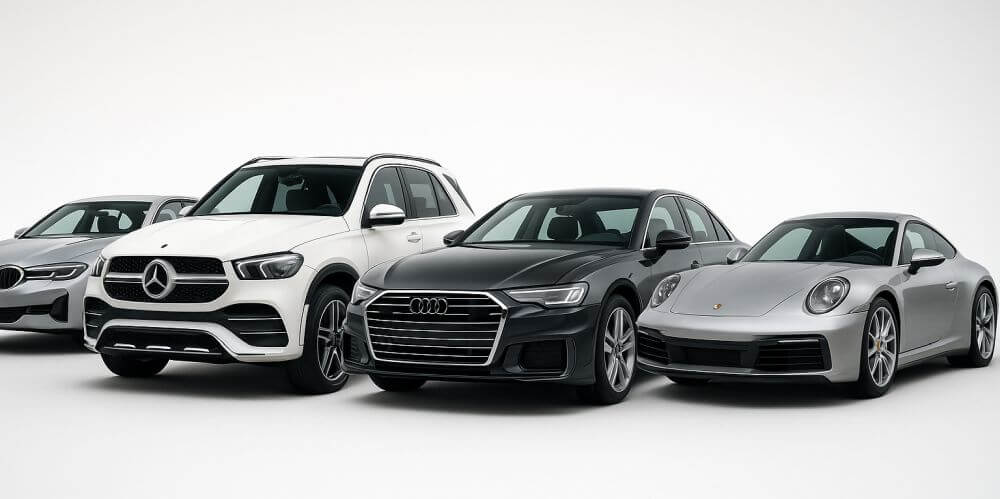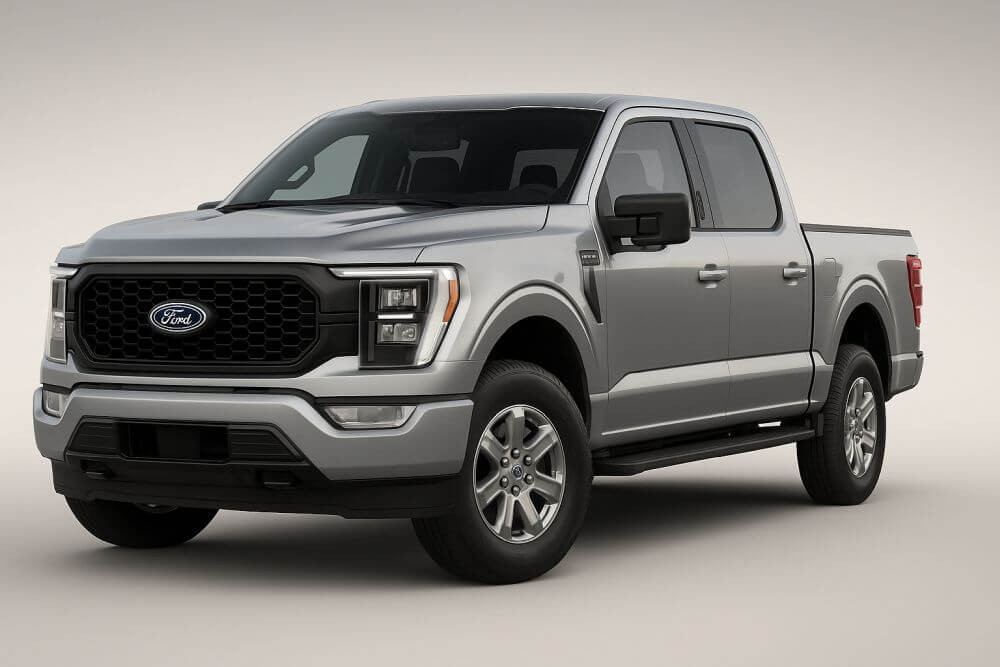German car brands have long stood as symbols of precision engineering, luxury craftsmanship, and exceptional performance. From the Autobahn to racetracks and city streets, these vehicles embody a blend of style, innovation, and reliability that appeals to drivers worldwide. Whether you’re eyeing a brand-new BMW, a certified pre-owned Mercedes-Benz, or a well-kept Audi, understanding a brand’s history, technology, and ownership experience can help you make the best choice.

If you’re buying a used German car, the smartest first step is to run a vehicle history report to uncover past accidents, title branding, maintenance records, and recall notices. Pair that with tools like a VIN decoder to reveal detailed specs and factory features, and a Car Value by VIN check to ensure you’re paying a fair market price.
Why German Car Brands Dominate the Global Market
Germany has been shaping the automotive industry for over a century. Its manufacturers set the benchmark for design, safety, and engineering—often influencing carmaking trends worldwide.
Key Reasons for Their Worldwide Appeal
- Precision Engineering – Every part is meticulously designed for performance, safety, and efficiency.
- Luxury and Comfort – Premium materials, ergonomic designs, and advanced climate control systems enhance every ride.
- Performance Pedigree – A deep connection to motorsports means many road cars inherit track-proven technology.
- Technological Innovation – Features like adaptive cruise control, head-up displays, and hybrid drivetrains often appear first in German models.
- Long-Term Value – Well-maintained models tend to hold their value better than many competitors.
According to the German Association of the Automotive Industry (VDA), the country exported over 3 million passenger vehicles in 2023, highlighting its global influence and demand.
A Closer Look at Leading German Car Brands
Mercedes-Benz
Founded in 1926, Mercedes-Benz is often credited with inventing the automobile. Its “Best or Nothing” motto reflects a relentless pursuit of excellence in luxury and safety.
Popular Models:
- Mercedes-Benz S-Class – Industry benchmark for technology and comfort.
- Mercedes-Benz GLE – Luxurious SUV with versatile performance.
- Mercedes-AMG GT – High-performance coupe with racing DNA.
BMW
Short for Bayerische Motoren Werke, BMW’s heritage lies in aviation and motorsport. Known as “The Ultimate Driving Machine,” BMW emphasizes driving pleasure.
Popular Models:
- BMW 3 Series – The gold standard in sport sedans.
- BMW X5 – Powerful midsize luxury SUV.
- BMW M4 – Precision-tuned performance coupe.
Audi
Audi stands out for its clean design language, Quattro all-wheel drive, and cutting-edge infotainment systems.
Popular Models:
- Audi A4 – Balanced blend of luxury and practicality.
- Audi Q7 – Premium family SUV.
- Audi e-tron – All-electric SUV with advanced tech.
Porsche
Synonymous with high-performance driving, Porsche blends track-ready engineering with everyday usability.
Popular Models:
- Porsche 911 – An icon for sports car enthusiasts.
- Porsche Cayenne – Performance SUV with luxury appeal.
- Porsche Taycan – Electric sports sedan pushing EV boundaries.
Volkswagen
Volkswagen, meaning “People’s Car,” is Germany’s most accessible brand, producing everything from compact hatchbacks to electric crossovers.
Popular Models:
- VW Golf – Versatile and fun to drive.
- VW Tiguan – Family-friendly SUV.
- VW ID.4 – Affordable electric SUV.
Opel
Opel focuses on affordability and efficiency while retaining a European flair.
Popular Models:
- Opel Astra – Stylish compact hatchback.
- Opel Corsa – Small yet surprisingly roomy.
Signature Traits of German Cars
1. Performance Engineering
German cars are designed with dynamic handling in mind. Even entry-level sedans have responsive steering and well-tuned suspensions.
2. Luxury Craftsmanship
High-quality leather, wood trims, and precision stitching are standard in premium models.
3. Advanced Safety
Many innovations—such as crumple zones and stability control—originated with German automakers.
4. Resale Strength
Because of brand prestige and engineering quality, used German cars often retain value, especially when backed by a clean vehicle history report.
How to Buy a Used German Car Wisely
Purchasing a pre-owned German vehicle can be rewarding if you follow a few key steps:
- Run a VIN Check – Identify accident history, title status, and odometer readings.
- Decode the VIN – A VIN decoder reveals the exact trim, engine type, and original factory options.
- Verify the Market Value – Use a Car Value by VIN tool to compare prices against similar listings.
- Check Maintenance History – German cars thrive with regular servicing; skipped maintenance can lead to costly issues.
- Inspect Electronics – Many models have complex electrical systems—test all features before buying.
German Luxury vs. Performance Segments
Germany excels in both luxury and performance:
- Luxury Leaders – Mercedes-Benz S-Class, BMW 7 Series, Audi A8.
- Performance Icons – Porsche 911, BMW M Series, Audi RS Series.
Drivers often choose these vehicles because they deliver comfort for long drives and thrilling performance for spirited driving.
The Future of German Automakers
The next decade will see massive shifts toward electrification, autonomous driving, and digital connectivity. Notable innovations include:
- Mercedes EQS – Electric luxury sedan with advanced driver assistance.
- BMW i4 and iX – EVs blending performance and range.
- Volkswagen Trinity Project – A new platform for future electric mobility.
Conclusion
German car brands represent a perfect fusion of engineering excellence, luxury design, and driving passion. Whether you’re seeking the prestige of a Mercedes-Benz, the performance of a Porsche, or the advanced tech of an Audi, Germany’s automakers deliver on every front.
When shopping—especially for a pre-owned model—combine a vehicle history report with tools like a VIN decoder and Car Value by VIN check to ensure you’re making a safe and smart investment. With the right research, a German car can be both a statement of style and a dependable long-term companion.
FAQs About German Car Brands
Which German car brand is most reliable in the long run?
Porsche frequently leads dependability studies, with Mercedes‑Benz and Audi performing very well when serviced on schedule. For any used model, confirm past care with a vehicle history report (https://www.vincheckpro.com/vehicle-history/) and match trim/options via the VIN before you judge reliability.
Are German cars more expensive to maintain and repair?
Generally yes—premium parts, complex electronics, and specialized labor can raise costs. You can manage this by choosing models with complete service records, following factory intervals, and pricing common wear items in advance.
What is the best German sports car for daily driving?
The Porsche 911 is the benchmark for performance and everyday usability. BMW M3/M4 and Audi RS5 are also strong “dual‑purpose” choices if you want four seats and a more practical trunk.
Why do German cars hold their value better than average?
Brand prestige, engineering quality, and enthusiast demand support resale prices. Well‑documented service history and accident‑free titles (verified by a vehicle history report at https://www.vincheckpro.com/vehicle-history/) further protect value.
How can I check the fair price of a used German car?
Use the Car Value by VIN tool to compare similar vehicles and options: https://www.vincheckpro.com/car-value-by-vin/. Pair that with a VIN decode to verify trim, engine, and packages that affect pricing: https://www.vincheckpro.com/vindecoder/.
What should I check on a high‑mileage German car before buying?
Confirm timing‑related services, transmission and cooling‑system work, suspension components, and electronic modules. Verify mileage and title status with a VIN check, then test all driver‑assistance and infotainment features.
Are German EVs (e‑tron, i4, Taycan, ID.4) good options used?
Yes, provided you validate battery health, warranty status, and charging history. Ask for service records and scan for recalls; then compare Car Value by VIN results against local listings to ensure you’re paying a fair price.


